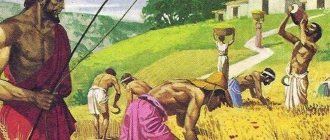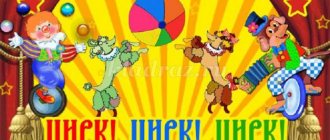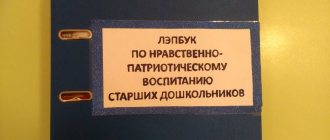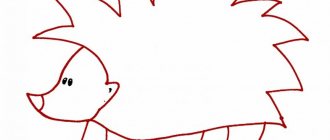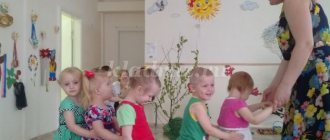Topic: Our country. My native land. Where does the Motherland begin?
Correctional educational goals:
— introduce children to the flag, anthem and coat of arms of Russia.
Corrective and developmental goals:
- strengthen the ability to form adjectives from nouns; - develop the ability to coordinate words in sentences; - activate the dictionary on the topic.
Corrective educational task:
- cultivate a sense of pride in your country.
Equipment: map of Russia, plot pictures during the lesson, pictures depicting animals, plants and birds living in various places on the planet, pictures depicting the flag, coat of arms of Russia, recording of the Russian anthem.
Progress of the lesson:
1. Organizational moment.
The children sit at the tables. The speech therapist reads the poem “Where does the Motherland begin?”
Where does the Motherland begin? From the picture in your primer, From good and kind comrades, Living in the neighboring yard. Or maybe it begins, With the song that our mother sang to us, With the fact that no one can take it away from us in any trials.
2. Announcement of the topic.
Today in class we will talk about what the Motherland is for every person and where it begins.
3. Introductory conversation.
So where does the Motherland begin? Homeland is the country in which you were born, it is the house in which you live, it is your family and friends.
Our home, city, country.
Our country is Russia. Each country has a flag, anthem and coat of arms. Our Russian flag has three stripes. White means purity and justice. Blue is a peaceful sky. Red - strength and beauty. This flag was introduced into Russia by Tsar Peter 1. When the national anthem is played and the national flag is raised, the citizens of this country stand up. Each country also has its own coat of arms. The coat of arms of Russia is a double-headed eagle.
You live in a city, town or village, and this place is necessarily marked on the map. But besides this, each person has his own home. People all over the world live in a wide variety of homes. They build them from various materials. Some houses are built of brick or stone, others of wood, clay or reeds.
4. Development of lexical and grammatical categories.
Game "Where do I live?"
My country is called ... (Russia) The capital of our country is ... (Moscow city) My city (village) is called - ... My home address is -
Game “Which, which, which?” (Based on plot pictures)
A city in Russia is a Russian city. A village in Russia is a Russian village. Passport of a citizen of Russia - Russian passport. Moscow is the capital of Russia - the Russian capital. The people who live in Russia are the Russian people. Monuments of Russia – Russian monuments. Our Motherland, what is it like? - Immense, boundless, rich, beautiful, powerful, huge. What needs to be done to keep it that way? To love, cherish, protect, preserve her wealth. What are the people called who stand guard over the Motherland? (Defenders of the Fatherland)
Physical education minute.
There is no more beautiful Motherland in the world - (Children walk in place) A fighting country of heroes. (They portray “heroes”) Here it is, called Russia, (They walk in place) It stretches from the seas to the seas. (spread their arms wide) A. Prokofiev.
Game “Animals and Plants of the Native Land”
Find animals, plants and birds that live in Russia. (Children are offered pictures depicting animals, plants and birds living in various places on the planet.)
Game "Where will I go for a walk"
Children look at pictures depicting the sights of their native land and tell where they would like to go for a walk or go on a trip.
On weekends I will go for a walk with mom and dad to the park. And I’ll go on a hiking trip to the bank of our river, etc.
5. Summary of the lesson.
The speech therapist offers to listen to the Russian anthem and reminds us how to behave when the anthem of our native country is played.
NOD "My Motherland" (Cognition. Search and research activities)
Goals:
1. Give children an idea of the Motherland. To consolidate children's knowledge about Russia as a state in which they live, a republic. 2. Contribute to the development of grammatical structure of speech, enrichment of vocabulary, and broadening of horizons. 3. Develop attention and memory. 4. Foster love for the Motherland, a sense of pride in it, respect for people of different nationalities.
Materials: map of Russia, illustrations of the nature of Bashkiria, sights of Russia, Bashkortostan.
Preliminary work: conversations about Russia, Moscow, Bashkiria, Ufa; working with a map of Russia, examining illustrations of the main attractions of Ufa and Moscow, Blagoveshchensk, memorizing poems about Bashkiria, proverbs about the Motherland, active Bashkir and Russian folk games.
Homework: prepare information and design wall newspapers about the sights of Moscow, Ufa, Blagoveshchensk.
Content:
1. Org. moment. Children enter the group, say hello and stand in a circle. Game "Kind Palms". - Guys, show your palms, rub them together. What do you feel? (warm). - This is the warmth of your kind hands, give it to your friends. Hello sun! Hello light! Hello, my good neighbor. Children sit on chairs.
2. Now listen to the poem.
How big is my land! How wide are the expanses of Lakes, rivers and fields, Forests, steppes and mountains! My land stretches From north to south When it’s spring in one region - In the other there’s snow and blizzard.
-What is this poem about? (about Russia...) - Correct. This poem is about Russia. And today we will talk about our Motherland - Russia.
3. Conversation about the country.
— What do you think the Motherland is? (This is the place where a person was born, grew up, where he lives). — Our Motherland is a large and beautiful country, it has a glorious history that we should be proud of. — What else can we call Russia? (Fatherland, Russia, Fatherland). — What do people who live in Russia call themselves? (Russians). — No country in the world has such a vast territory as Russia. At one end of our country it can be snowing, and at the other the sun is hot; at one end of our country people go to bed, and at the other the morning begins. —What is the main wealth of our country? (People). - Right. People of different nationalities live in our country. — What nationalities do you know? (Russians, Mari, Bashkirs, Tatars, Chuvash...). Each nation has its own culture and traditions. In ancient times, the Russian people, after the harvest, organized holidays. They danced in circles and played outdoor games. And now I invite you to play the Russian folk game “Arina”
Russian folk game "Arina"
- Well done, that's right. Now tell me, which city is the capital of Russia? (Moscow). - Right. Moscow is a very big and beautiful city. The government of our country works there. There are many attractions there. What landmarks do you know? (Kremlin,..) Children's performance.
4. Conversation to the Republic of Bashkortostan.
— Guys, Russia is our big Motherland, and each person also has his own small Motherland. — What do you think, for us, is a small Motherland? (Our Republic of Bashkortostan). - Right. Look at the map, here lies the beautiful small republic of Bashkortostan. — Bashkir poets, glorifying our republic, wrote many poems. Let's remember and tell them.
• Bashkortostan is my native land, I am proud and happy about you! Your valleys, rivers and fields - All this is you, beloved land.
• Bashkiria, My land and sky, My love, My nightingale land. I feel sorry for the one who has never been here. I feel sorry for the one who never sang.
- Well done boys. Tell me, which city is the capital of Bashkiria? (Ufa). There are also many many attractions in Ufa. — What sights do you know? Children's performance. - What city do we live in? (Blagoveshchensk) - What sights of our city do you know? Children's performance. People of different nationalities also live in our republic. All people live in peace and harmony. The Bashkir people have developed their own culture and traditions. And now I invite you to play the Bashkir folk game “Timerbay”.
Bashkir game “Timerbay”
Well done! Glorifying the Motherland, the people composed many different proverbs. Let's remember them.
• Your homeland is more valuable than gold • To live is to serve your homeland • Don’t spare your strength for your homeland • There is no more beautiful thing in the world – our homeland • Know how to defend your motherland • Everywhere is good, but there is no sweeter homeland.
- Well done! How many proverbs do you remember?
5. Summary. - What did we talk about today? - What new did you learn? — Guys, you are all little Russians. You can make our country strong and powerful if you love your friends and loved ones. Let's look at each other, smile, and say together: “If friendship is great, the Motherland will be strong!”
Author: Toymurzina Natalya Aleksandrovna, teacher, MADOU d/s No. 12 “Ryabinka” of a combined type, Blagoveshchensk, Republic of Bashkortostan
The article is published in the author's edition
